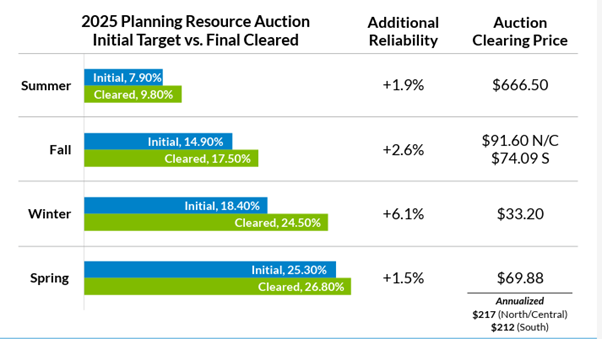News
better business decisions
Posted 9 months ago | 2 minute read

MISO summer capacity prices jump to $666.50/MW-day
For the upcoming Summer capacity prices across the MISO footprint rose to $666.50/MW-day—up from $30/MW-day last year, according to the results of its latest planning resource auction released on April 28. The auction results leave MISO’s northern and central regions with a 10.1% reserve margin for the summer and its southern region with an 8.7% margin for the same period, the grid operator said.
This is the first year MISO utilized a Reliability-Based Demand Curve (RBDC), which introduces a reliability-focused pricing structure that more accurately reflects the increasing value of accredited capacity as the system approaches minimum resource adequacy targets. MISO’s 2025 Planning Resource Auction (PRA) results demonstrate sufficient capacity to meet demand and reserve requirements throughout the footprint for the 2025-26 planning year.
Surplus capacity in the Summer has reduced from approximately 6.5GW in 2023, to 4.6GW in 2024, to 2.6GW in 2025. This is reflected through higher prices. Annualized, the prices are $217/MW-day for the North/Central region and $212 for the South region.

Source: MISO
Capacity for the Fall season cleared at $91.60/MW-day in the northern and central region and at $74.09/MW-day in the south. Winter season clearing prices cleared at $33.20/MW-day in all zones. Spring season capacity prices cleared at $69.88/MW-day in all zones.
About 9.1 GW of solar and 6 GW of wind cleared the auction, up from 4.9 GW and 5.2 GW, respectively, a year ago, according to MISO.
About 4.3 GW of behind-the-meter generation cleared for the summer season, up from 4.1 GW a year ago, and 9 GW of demand response resources cleared, up from 8.1 GW in 2024.
“MISO, our states and our stakeholders continue to make progress responding to the resource adequacy challenges we face, and these results offer valuable insights to allow members to maximize their existing resources and plan for the ongoing energy transition,” Johnson said.

Source: MISO






